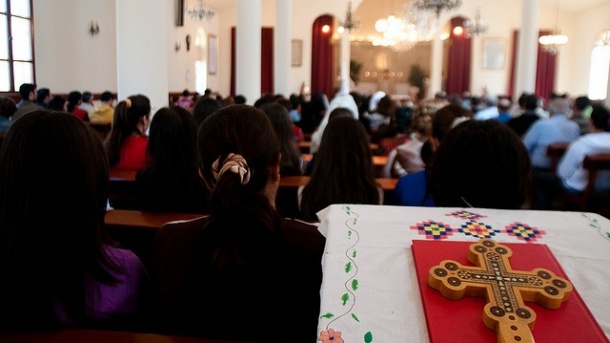



Thinking with the Whole Church
Salt + Light Media
Saturday, September 28, 2013

This post is part of a series of reflections by TJP writers on Pope Francis’s recent interview.
Full Series List: The Papal Interview: Young Jesuits React and Reflect
The Original Interview: At America Magazine
By Paul Lickteig, SJ
We should not even think, therefore, that ‘thinking with the church’ means only thinking with the hierarchy of the church…it is the experience of ‘holy mother the hierarchical church,’ as St. Ignatius called it, the church as the people of God, pastors and people together. The church is the totality of God’s people.”
What happens when we consider this quote from the Pope in his recent interview as translated in America Magazine? As Pope Francis remarks earlier, he is a sinner (not was, but is). Like him, we are (not were) sinners. Yet, we are loved, and we work out our experience of God’s grace as it is revealed in our lives. As individuals, and as an institution, we are called to accept our sinfulness. Yet, we trust in the revelation of God’s Word, both in scripture and in our tradition, that love will find a way to bring us into union with one another.
The difficulty for many of us is that we find the temptation to judge. Even in our various expressions of fidelity, we find that how we understand scripture and tradition might set us at odds with others. The issues of belief that set us apart from one another are not merely philosophical arguments, they have an actual impact on how we live our lives. This is the scary part of any belief: someone is bound to be right, and someone is bound to be wrong. When we have disagreements, we might find the need to vigorously defend what we believe. For Christians, it is particularly difficult, because the “rightness” of our expressed beliefs depends not upon creating hurt, frustration, doubt and anger, but in offering a source of compassion, mercy, insight and trust … even amidst disagreement.
What happens when one person speaking from a position of authority seems to have a different opinion than another person in a similar position? What happens when we experience the difficulty in our communities between the beliefs of the assembled faithful and those in positions of leadership? What happens when we, as individuals, cannot reconcile the ways we actually live with our beliefs about how we may be called to live?
Perhaps these are the tensions to which Francis speaks. We are called to make sense of our experience, as individuals and as a Church. Just as throughout history, the Church has sought to clarify and reinterpret the revelation of God’s love, so do we as individuals attempt to make sense of this in our own lives. Just as the Church struggles to reconcile its actions which have created harm with the many works that have brought good, so too do we as individuals attempt to reconcile our past misdeeds with our more benevolent deeds. Even further, it is not just a matter of coming to accept what we have done, but in finding a new way to live that does justice to the faith in which we were raised.
So, we look to the tradition, we look to scripture, we look to our communities, and we turn to prayer. It is in prayer that we come to terms with the tradition that held us together for centuries, and make sense of it amidst a community of believers who are coming to know God in the present. We are called to be faithful, to the tradition, to our experience as a community of believers, and to our own conscience. Our conscience is the place where faith comes to life. It is the place where, as individuals and as a people, as members of the Body of Christ, we are each asked to trust God and discover how to care for our neighbors. Then, as one community, the Body of Christ, we learn together how to move as one people towards a future that we can only barely apprehend.
---
Photo: Michael Swan via Flickr
Related Articles:
<<
SUPPORT LABEL
$50
$100
$150
$250
OTHER AMOUNT
DONATE
Receive our newsletters
Stay Connected
Receive our newsletters

Stay Connected







